On July 27, the U.S. Congress passed a bill imposing new sanctions on Russia.[1] The Russian news agency Tass reported that European countries are concerned about the fact that the U.S. bill mentions the Nord Stream-2 project gas pipeline. Tass reported: "The document says that the U.S government should push ahead with its efforts to counter the construction of the Nord Stream-2 pipeline. It asserts that the project has a harmful effect on the European Union’s energy security, the development of the gas market of the Central and Eastern Europe and energy reforms in Ukraine. The bill also states that the U.S. government should prioritize exports of U.S. energy resources to Europe to create jobs in its economy." Russia hopes to exploit differences between the Europeans and the United States.
Meanwhile, the Russian Foreign Ministry stated that Washington will have to reduce the number of its diplomatic staff in Russia to 455 people. At the moment, the U.S. diplomatic mission includes more than 1,200 personnel. In an interview with the Rossiya 1 TV channel, Russian President Vladimir Putin said: "The American side has made a move which, it is important to note, hasn't been provoked by anything, to worsen Russian-U.S. relations. [It includes] unlawful restrictions, attempts to influence other states of the world, including our allies, who are interested in developing and keeping relations with Russia… We've been waiting for quite a long time that maybe something would change for the better, we had hopes that the situation would change. But it looks like, it's not going to change in the near future... I decided that it is time for us to show that we will not leave anything unanswered."
Below is a selection of official Russian reactions to the new round of U.S. sanctions targeting Russia:
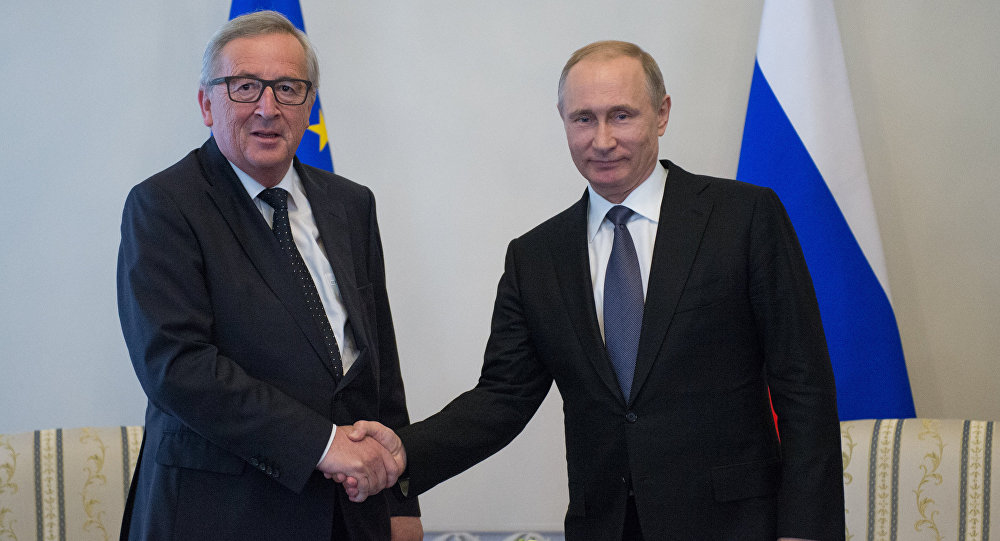
Putin with EU's Juncker, Russia believes the EU will side with it against the new round of U.S. sanctions (source: Sputniknews.com)
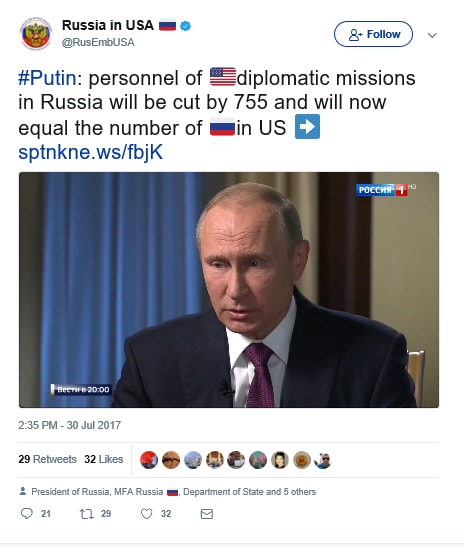
(Source: Twitter.com/RusEmbUSA, July 30, 2017)
Russia's MFA: 'Russia Reserves The Right To Resort To Other Measures Affecting U.S.' Interests On A Basis Of Reciprocity'
On July 28, the Russian Ministry of Foreign Affairs published an official note, notifying the U.S. regarding retaliatory countersanctions:
"On July 27, the U.S. Congress passed a new bill on tougher anti-Russia sanctions. This measure is further proof of the Unites States' extremely hostile foreign policy. Hiding behind its own 'exclusiveness', the United States arrogantly ignores the stances and interests of other countries.
"It is common knowledge that the Russian Federation has been doing everything in its power to improve bilateral relations, to encourage ties and cooperation with the U.S. on the most pressing issues on the international agenda including fighting terrorism, proliferation of weapons of mass destruction, illegal drug trafficking, illegal migration, cybercrime, etc. Our understanding has been that we can only solve these global problems if we work together. We believe the majority of people in the world share this approach.
"Meanwhile, the United States is using Russia's alleged interference in its domestic affairs as an absolutely contrived excuse for its persevering and crude campaigns against Russia. This activity contradicts the principles of international law, the UN Charter, WTO regulations and, simply, the common standards of civilized international communication.
"The United States continues to pass more unlawful sanctions against Russia, to seize Russia's diplomatic property, which is formalized in binding bilateral documents, and to deport Russian diplomats. This is clearly a violation of the Vienna Convention on Diplomatic Relations and generally recognized diplomatic practices.
"The adoption of the new sanctions bill is an obvious indication that relations with Russia are in thrall to the political infighting in the United States. Moreover, the new bill sets to a goal to create a dishonest competitive advantage for the U.S. in the global economy through the use of political means. This blackmail aimed at restricting Russia's cooperation with its foreign partners threatens many countries and international businesses.
"Despite Washington's constant outbursts, we have adhered to responsible and reserved behavior and have not responded to express provocations until now. However, the latest events confirm that certain circles in the U.S. are fixated on Russophobia and open confrontation with our country.
"- Therefore, we suggest our American counterparts bringing the number of diplomatic and technical staff at the U.S. Embassy in Moscow, the consulates general in St Petersburg, Yekaterinburg and Vladivostok, into strict correspondence with the number of Russian diplomats and technical staff currently working in the United States, until September 1, 2017. This means that the total number of American diplomatic and consular office employees in the Russian Federation must be reduced to 455 people. In the event of further unilateral action on behalf of US officials to reduce the Russian diplomatic staff in the U.S., we will respond accordingly.
"- Starting August 1, the use of all the storage facilities on Dorozhnaya Street in Moscow and the country house in Serebryany Bor will be suspended from use by the U.S. Embassy.
"Russia reserves the right to resort to other measures affecting U.S.' interests on a basis of reciprocity."
(Mid.ru, July 28, 2017)
Lavrov's Phone Conversation With Tillerson
The Russian MFA reported: "On July 28, Foreign Minister Sergey Lavrov had a telephone conversation with U.S. Secretary of State Rex Tillerson.
"Sergey Lavrov emphasised that the decision to even out the number of employees in U.S. and Russian diplomatic missions and to suspend the use of two properties by the U.S. Embassy is the result of a series of hostile steps by Washington. Such actions include illegal anti-Russian sanctions and slanderous accusations against Russia, the mass expulsion of diplomats and expropriation of our diplomatic property.
"The Minister emphasized that Russia did all it could to improve relations and showed restraint in response to US provocations. However, recent events demonstrated that US politics have been captured by the Russophobic forces that have been pushing Washington toward the path of confrontation. The limited and absolutely adequate measures we took are not an “eye for an eye” response but a forced step that is fully consistent with international practice and is aimed at protecting lawful Russian interests in the hope that the U.S. side will finally reflect on the adverse consequences of its policies.
"Sergey Lavrov reaffirmed that Russia still stands ready to normalize bilateral relations with the United States and cooperate on major international issues. However, this is only possible on the basis of equality, mutual respect and a balance of interests. The officials agreed to continue contacts on all issues of Russian-U.S. relations."
(Mid.ru, July 28, 2017)
Lavrov: 'I Didn’t Even Suspect That U.S. Politicians Could Succumb To This Mass Psychosis'
In an interview to Iraqi Kurdish Rudaw TV channel, Russian Foreign Ministry Sergey Lavrov commented about the current state of Russia- U.S. relations:
Lavrov: "We are certainly not happy about the current state of our relations. We have inherited many problems from the Obama administration, time bombs and decisions that were taken by the outgoing administration in a fit of agony, when they were completely demoralized by the election results and decided to spend the remaining time in the White House by doing disgusting things, especially considering its desire to further undermine Russian-U.S. relations.
"We see how difficult it is for some people in Washington to show common sense amid paranoid Russophobia, which is flourishing even though many months of investigations have not produced a single piece of evidence of Russia’s alleged interference in U.S. affairs. Being a normal person in Washington is rather difficult now.
"I didn’t even suspect that U.S. politicians could succumb to this mass psychosis. I interacted with many of them during my time in New York. I am surprised at everything that is happening there now. Many of those who have succumbed to this political movement, which is completely abnormal for America, many of them are probably aware of this abnormality and believe that it must stop one way or another. Unfortunately, they are driving themselves up a very high fence, from which it will be very difficult to get down. This campaign must be allowed to run its course. I don’t think that anyone can influence it, but it will fizzle out, if only because, as I said, there is not a single fact to prove Russia’s alleged interference. Everything the U.S. newspapers and television shows keep talking about has been concocted out of thin air. Sorry for this unparliamentarily language."
(Mid.ru, July 24, 2017)
Putin: 'We See That For A Long Period Of Time, There Have Been Ongoing Attempts To Provoke Us'
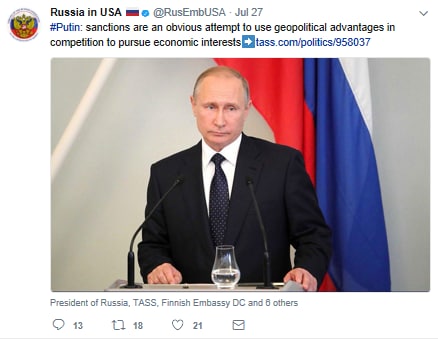
(Source: Twitter.com/RusEmbUSA, July 27, 2017)
On July 27, during a joint press conference with Finnish President Sauli Niinisto, Russian President Vladimir Putin responded to a question about the anti-Russian sanctions:
Pavel Zarubin, Rossiya TV channel: "Good afternoon, my name is Pavel Zarubin, Rossiya TV channel. I have a question for both leaders. I would like to continue with the high-profile issue of the new U.S. bill on toughening anti-Russian sanctions. Naturally, this issue is high-profile also because in the last few days and weeks we have been hearing very tough criticism of this bill from many key European politicians and European agencies.
"After all, what is happening is that the United States wants to apply its laws to the territories of other countries, EU countries, and to make its bill transnational. Have you discussed this issue? What is your attitude to it? After all, as far as I understand, the independence and economic security interests of other countries are at stake.
"And I have a question for the President of Russia. If this bill is adopted, what will be Russia’s response? What will it be like? Are any Russian-U.S. contacts possible on this matter? For instance, a telephone conversation with the U.S. President. Thank you."
Vladimir Putin: "As for the transnational character of U.S. legislation, I have been talking about this for a long time, since 2007 (I think I spoke in Munich about this). It is exactly as I said. This practice is unacceptable – it is destroying international relations and international law. We have never accepted it and will not accept it. As for the reaction of other states of the world, it depends on the extent of their sovereignty and readiness to defend their own national interests.
"If the same happens in this case, it will cause particular regret because these actions will have aggravating factors. I would call them particularly cynical because they amount to an obvious attempt to use one’s geopolitical advantages in the competitive struggle in order to protect one’s economic interests at the expense of one’s allies, as in this case.
"We have not seen the final version yet and we do not have a final opinion on this matter. But we see that for a long period of time, there have been ongoing attempts to provoke us – many Russian diplomats were expelled with no explanation of the reason and diplomatic property was seized, which is beyond comprehension as it violates fundamental norms of international law regarding diplomatic relations. The sanctions are absolutely illegal from the perspective of international law and they violate the principles of international trade and World Trade Organization rules. As you know, we are being very restrained and patient, but at some point we will have to respond. We cannot tolerate this loutish behavior towards our country forever. But how we respond will depend on the final version of the bill that is being debated in the U.S. Senate."
(Kremlin.ru, July 27, 2017)
Senator Kosachev: 'We Should Be Self-sufficient. Without It, They Will Always Try To Treat Us Haughtily As Non-Equals'
Russian Senator Konstantin Kosachev wrote a long post in his Facebook account, regarding the new round of sanctions:
"After the meeting of the two presidents in Hamburg [at the G20], I've expressed a cautious hope that this meeting could serve as a prelude to a breakthrough in U.S.-Russia relations. Hope is the last thing to die, but it does die. Considering the monolithic House of Representatives vote on the sanctions against Russia, Iran and N. Korea, neither will a breakthrough occur nor even normalization. Moreover, a further deterioration in the bilateral relations becomes inevitable, although there is seemingly no room for a further deterioration.
"What is happening?
"In a broader sense, irrespective of currents issues, the Americans are brazenly exterminating any kind of competitive 'alternative vision,' while viewing Russia as a dissident, challenging the unipolar world order. In a narrower context, the American political elite, which has cast off all restraints [literally the Russian idiom- broke the brakes] and undergoing one [political] failure after the other internally and externally, has chosen our country as a target or more precisely a training wall. Congressmen think that they can justify the illegitimacy of Trump's election by Russia's interference in the elections. They also think they can justify supporting the legitimacy of U.S. actions aimed at toppling inconvenient regimes the world over by Russia's support of Assad. In their eyes, Russian –Iranian cooperation explains all the Americans' problems in their unsuccessful anti-terror and anti-proliferation attempts. The Ukrainian crisis explains in their eyes the Russian threat to their European allies and cements transatlantic solidarity. And so on.
"The Americans are trying to behave as the world's gendarme. But they [more closely] resemble a spoiled brat: someone takes away a toy –he falls on his belly and bursts into hysterics while banging the ground with his feet. This behavior is unreasonable and unjustified. It also ignores the consequences and the circumstances.
"What should be done?
"First of all sit tight. Our official reaction should follow the bill's entry into force (it undoubtedly will e, but nevertheless…).
"Secondly, we should prepare such a reaction in advance, since it should definitely follow. It should not be symmetric but should be painful for the Americans. The reaction should include the response for this [new] bill and all the previous actions like [diplomatic] property and so on.
"Third, it should proceed from the assumption that given the anti-Russian consensus in Congress (yesterday's vote of 419 in favor against 3 opposing [the sanctions]) the dialogue will be unsuccessfule. And this will be the case for a long time. President Trump will be unable to cope with his Congress. Thus, we need to build relations with the rest of the world, which is much broader that the Western world. The light does not solely revolve around the U.S..
"Fourth, we definitely should discuss the existing situation with the Europeans. We shouldn't nourish illusions – they won't be our allies, but since their own interests are in jeopardy, there may be a temporal mésalliance.
"Fifth, without sliding into self-isolation, we should concentrate on internal development where we do not have any adversaries or competitors. We should finally develop Russia with its colossal resources and opportunities. We should be self-sufficient. Without it, they will always try to treat us haughtily as 'non-equals.'"
(Facebook.com/profile.php?id=100002123135703, July 25, 2017)
Deputy FM Ryabkov: 'I Don’t Consider This Bill Frightening, I Consider It… Defective, Harmful For The U.S. Itself And Doomed To Failure'
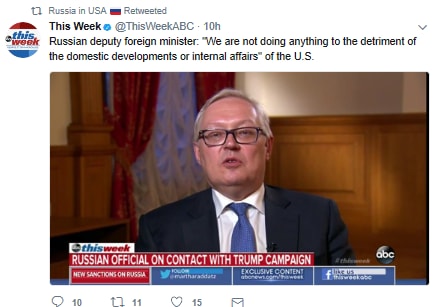
(Source: Twitter.com/RusEmbUSA, July 30, 2017)
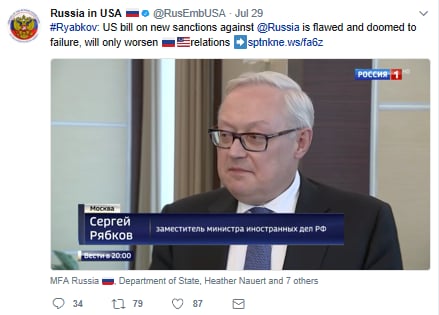
(Source: Twitter.com/RusEmbUSA, July 29, 2017)
In an interview with the Rossiya-1 television channel, Russian Deputy Foreign Minister Sergei Ryabkov said: "Regrettably, our calls, our patience, our readiness to demonstrate good will, not to yield to emotions are finite. We were forced to take response measures… These are not sanctions but Russia’s response measure to even the balance. If the United States, in its anti-Russian frenzy, tries to do anything else to harm us, a tit-for-tat reaction will follow. It is a negative spiral… Today, I told that to U.S. Ambassador John Tefft, with whom I had a hard but professional talk. I reassured him that there are no signs on the Russian part that our policy is ruinous… On the contrary, we want to restore justice and call on the Americans to show restraint. I don’t consider this bill frightening, I consider it… defective, harmful for the United States itself and doomed to failure. It means that the goals set by its initiators will never be achieved. Relations with Russia will only worsen and the perspective of their normalization will go further on into the future… Once again, we are warning the U.S. side, and now I am doing it publicly, against attempts to further unwind the spiral of confrontation, against attempts to hit our relations over and over again… Now, the choice and assessment of the consequences of what is going on depends completely on the Americans. I insist that in case of these or those actions we will have to take retaliation steps, countermeasures. They might be absolutely tit-for-tat but they might not be that way at all… In case Washington does not demonstrate due responsibility, we will respond to further provocative and hostile steps."
(Tass.com, July 28, 2017)
[1] As reported by the Russian news agency TASS: "The U.S. bill approved…contains restrictive measures against Russia imposed by the Obama administration on the basis of his executive decrees. The issue at hand is the sanctions imposed on March 6 and December 18, 2014, April 1, 2015, July 26 and December 29, 2016." (Tass.com, July 26, 2017)
The bill passed the House by a 419-to-3 margin, whereas on July 27 the bill passed the Senate by a 98-to-2 margin.
The bill provides sanctions for activities concerning: (1) cyber security, (2) crude oil projects, (3) financial institutions, (4) corruption, (5) human rights abuses, (6) evasion of sanctions, (7) transactions with Russian defense or intelligence sectors, (8) export pipelines, (9) privatization of state-owned assets by government officials, and (10) arms transfers to Syria. See: www.congress.gov/bill/115th-congress/house-bill/3364





